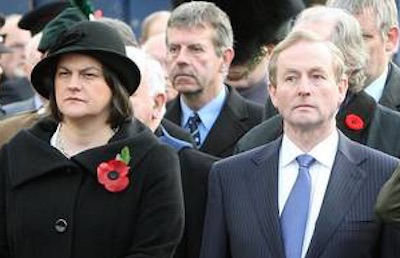
In an unusual development in the peace process, Taoiseach Enda Kenny has criticised the new DUP leader Arlene Foster after she denounced commemorations of the 1916 Easter Rising.
The rising in Dublin saw rebels issue a proclamation of independence and engage in armed struggle against British rule, ultimately leading to the liberation of 26 of the 32 counties of Ireland.
Moments after Arlene Foster was formally appointed First Minister in Belfast, Mr Kenny said it was her duty to represent both communities in the Six County executive.
Both the Dublin government and Sinn Fein’s Deputy First Minister, Martin McGuinness have again sought to “reach out” to pro-British elements through “inclusive” centenary events, despite similar gestures falling on deaf ears in the past.
Easter Rising commemoration programmes north and south of the border have been designed to balance the Rising with the involvement of unionists and other Irish recruits in the British Army’s Battle of the Somme in 1916. However, the revisionism and self-censorship involved in this approach has brought criticism from nationalists and republicans.
Last week, the Democratic Unionist Party leader said she would not attend any of the commemorations of the Rising. Foster denounced the event as “a violent attack on the United Kingdom” which gave “succour” to the armed struggle in the North.
And Foster was also accused of emphasising a sectarian approach to her new role as First Minister when, during her first engagement at a primary school, she lauded the English queen, Elizabeth Windsor, as a “tremendous leader”.
Commentators have pointed out that Foster has had no problem taking part in events to mark US Independence Day, which marks another rebellion against the British state.
During a briefing at Government Buildings in Dublin around the time the Fermanagh woman was being installed as head of the Stormont administration, Mr Kenny said he wished her well in her new role but that he was “disappointed” with her remarks.
“These (centenary commemorations) have been put together in a very sensitive, comprehensive, inclusive way - both north and south.”
He pointed out that some nationalist leaders in the Six Counties had attended unionist commemorations and events in recent years.
“I’ve been up at Enniskillen myself for the last number of years, on the occasion of the wreath laying, where I have met Arlene over the last four years.
“In the case of representing all the people of Northern Ireland, both nationalist and unionist, obviously they have come together in quite a number of areas,” Mr Kenny added.
Martin McGuinness did not condemn Foster’s stance, but said that the centenaries provide an opportunity to “explore, understand and celebrate - rather than fear - our differences”.
“I will have no difficulty in recognising and commemorating the massive humanitarian loss across the island of Ireland as a result of the First World War,” he said.
“Is unionism prepared to acknowledge the importance of the Easter Rising in the nationalist psyche?”
But he said he believed he would chave a positive working relationship with his new partner in government.
“I pledge a positive spirit, a constructive spirit and a good heart in working with Arlene. I am an Irish republican and Arlene Forster is a unionist. Neither my republicanism nor Arlene Forster’s unionism will be in any way diminished by our working together,” he said.
“Unionism is not the enemy; the enemy is poverty, disadvantage, and unemployment,” he said.
![[Irish Republican News]](https://republican-news.org/graphics/title_gifs/rn.gif)
![[Irish Republican News]](https://republican-news.org/graphics/title_gifs/harp.gif)

